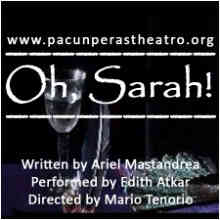
History and memory meld in Oh, Sarah by Pacun Peras Theatro playing at the Factory Studio Theatre as part of the 2016 Toronto Fringe Festival. Unfortunately, story and staging combine to make a compelling story deteriorate into confusion.
Oh, Sarah, where do I start?
Edith Acker plays Sarah Berhardt, a famous French actor from the late 19th and early 20th century. We are in Bernhardt’s private room as she tries writes her autobiography, telling how she came to Paris and, eventually, fame.
While the play-text is compelling, an intriguing examination of a woman in her twilight years, the show itself struggles with its content, context, and delivery.
How and why this happens, I’m not entirely sure. Oh, Sarah starts strong. I loved the top of the show, framing Acker as a confident figure, witty and amused with herself. Does she know we’re there? Does it matter? Not at first. She thinks she’s brilliant and she belongs on-stage, with an audience, real or imagined.
Then somewhere along the way, Acker and, subsequently the play, loses momentum.
I suspect the problem lies in a creative vision that needed a little more fleshing out. Staging, text, and acting choices felt like they were at odds with each other. Where the story felt like it demanded movement, we had a woman at a writing desk, where the story needed tight direction to land the big reveal, everything seemed to lose coherence.
I think the text invited fluidity on the stage because it was about memory. I could see that director Mario Tenorio had moments where he tried to embrace that relationship between past and present. For example, in two scenes Acker spread her wings- taking centre-stage as the odd Parisian figure, or in one cool moment, performing a melodrama in a mocking, truncated show within a show to contextualize the past in relation to her current circumstance.
And yet, prolonged and unnecessary blackouts left the movement jagged. Instead of being part of the story, breaking down lines between now and then, using blackouts created a very specific space for ‘now’ and ‘then.’
Considering the play is a constant reflection on Bernhardt’s life, with so much time in the past, why does Acker spend all her time at the desk? She is locked behind it for most of the show, dependent on writing out memories instead of acting them out.
This might be a choice referencing a later reveal, but if it is, it’s not well established in performance.
Finally, as past and present fuse in the text, Tenorio abruptly decides to depict shifting time and location with various sound effects representing events in Bernhardt’s life. It should be a really emotional moment but it didn’t work for me because it didn’t connect to what had been established.
Oh, Sarah needed to fully integrate that fluidity earlier, and not just for the sake of the show’s energy. The sudden narrative shift at the end made the production feel confused and disjointed. I wasn’t sure anymore about what I was watching because it made no sense when set against the original structure. That, in turn, made me check out from what was meant to be an emotional ending.
And that’s honestly too bad. The story laid the groundwork for an slow deterioration of reality but the staging held onto to a very literal framework to its detriment.
Details
- Oh, Sarah! plays at the Factory Theatre Studio. (125 Bathurst St)
- Tickets are $12 at the door and in advance and can be purchased online, by telephone (416-966-1062), from the Fringe Club at Honest Ed’s Alley, and — if any remain — from the venue’s box office starting one hour before curtain. The festival also offers a range of money-saving passes for serious Fringers.
- Be aware that Fringe performances always start exactly on time, and that latecomers are never admitted.
- This venue is NOT wheelchair-accessible.
Performances
- Thursday June 30th, 06:30 pm
- Saturday July 2nd, 11:00 pm
- Sunday July 3rd, 04:45 pm
- Tuesday July 5th, 08:45 pm
- Wednesday July 6th, 02:15 pm
- Friday July 8th, 03:30 pm
- Saturday July 9th, 11:30 pm
Photo courtesy of Pacun Peras Theatro
